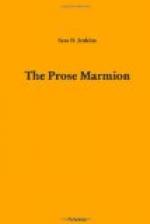The spirit of war flowed in every vein. Marmion flung himself into the saddle, scarce bade adieu to the good Abbot, commanded the young knight to escort the Lady Clare, and dashed on to the Tweed. The river must be crossed. Down to the deep and dangerous ford, he ventured desperately. Foremost of all, he gallantly entered and stemmed the tide. Eustace held Clare upon her saddle, and old Hubert reined her horse. Stoutly they braved the current, and though carried far down the stream, they gained the opposite bank.
The train followed. Each held his bow high over his head, and well he might. Every string that day needed to be unharmed by moisture, that it might ring sharply in the coming combat.
Marmion rested a moment, only to bathe his horse, then halted not until Surrey’s rear guard was reached. Here on a hillock, by a cross of stone, they could survey the field.
“The hillock gain’d,
Lord Marmion stayed:
‘Here, by this cross,’
he gently said,
’You well may view the
scene.
Here shalt thou tarry,
lovely Clare:
Oh! think of Marmion
in thy prayer!
Thou wilt not? well,—no
less my care
Shall, watchful, for
thy weal prepare.
You, Blount and Eustace,
are her guard,
With ten
picked archers of my train;
With England if the
day go hard,
To Berwick
speed amain.
But if we conquer, cruel
maid,
My spoils shall at your
feet be laid,
When here
we meet again.”
He waited for no answer, but dashed over the plain to Lord Surrey, who met him with delight.
“Welcome, good Lord Marmion; brief greeting must serve in time of need. With Stanley, I myself, have charge of the central division of the army, Tunstall, stainless knight, directs the rearward, and the vanguard alone needs your gallant command.”
“Thanks, noble Surrey,” Marmion said, and darted forward like a thunderbolt. At the van, arose cheer on cheer, “Marmion! Marmion!” so shrill, so high, as to startle the Scottish foe.
Eustace and Blount sadly thought,
“’Unworthy office
here to stay!
No hope of gilded
spurs to-day.’”
When King James saw that the English army by its skilful countermarch had separated him from his base of supplies, and from his own country, he resolved upon battle at once. Setting fire to his tents, he descended, and the two armies, one facing north, the other south, met almost without seeing each other.
“From the sharp ridges
of the hill,
All downward to the
banks of Till,
Was wreathed
in sable smoke.
Volumed and fast, and
rolling far,
The cloud enveloped
Scotland’s war,
As down
the hill they broke;
Nor mortal shout, nor
minstrel tone,
Announced their march;
their tread alone
Told England, from his
mountain-throne
King James
did rushing come.




